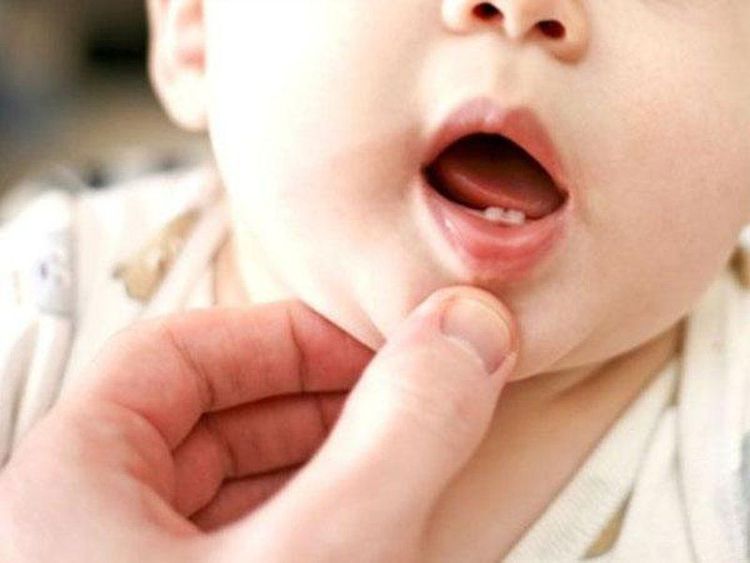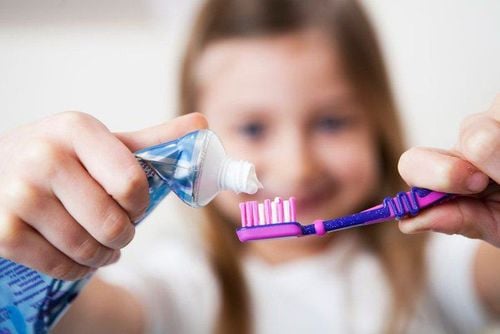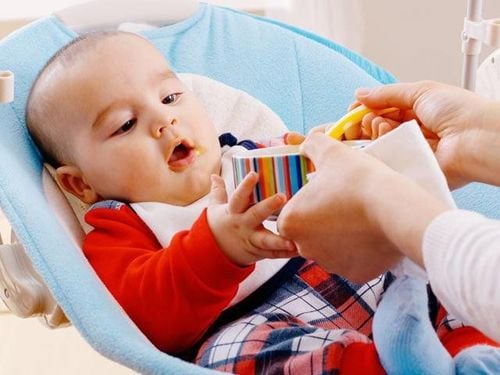This is an automatically translated article.
Usually, the first baby tooth comes in when a baby is 6 months old and most children have all 20 baby teeth before their 3rd birthday. Children's teething age may be different, a few months earlier or later is normal, parents do not need to be too worried.
1. When do babies get all their teeth out? The age of teething of children is very different, some babies do not have any teeth even after 1 year old, while there are babies who have grown quite fully by this age. Most babies will have their first teeth between 4 and 7 months old. If your baby still hasn't had any teeth by 15-18 months, take her to the pediatric dentist for a check-up.
Baby teeth usually appear singly, one by one every month. Although not always fixed, but in general, children have a common order of teething as follows:
First 2 teeth in the middle of the lower jaw Then 2 doors in the upper jaw Next are the teeth on the sides Finally, the molars. These baby teeth can grow irregularly, short and long, but you do not need to be too worried because they will grow straight out over time.
When does the last tooth of a child come in? While a toddler's first molars may begin to appear by the time he turns 1 year old, the last teeth are usually all out by the time a child is 2 years old. This is the second molar, located at the back of the mouth, upper and lower jaw.
When does the baby come in all the teeth? By the age of 3, children will have a full set of 20 baby teeth (10 in the upper jaw and 10 in the lower jaw). They won't fall out until a child's permanent teeth are ready to erupt at around age 6.

Đầu tiên, trẻ sẽ mọc 2 răng hàm dưới theo thứ tự mọc răng phổ biến
2. Teething Age Symptoms You might think that molars are more painful because they are bigger and blunter than the front teeth. In fact, the timing of the last teeth coming in is often not as noticeable as the first ones. According to dentists, very few parents are concerned about their toddler teething. Maybe it's because they think it's natural and doesn't require intervention, or the babies simply don't have much pain.
Experts don't know if teething actually causes symptoms like irritability, diarrhea and fever, or if these common symptoms are unrelated to teething and just coincidentally with other teething. new teeth come in.
Even so, many parents still find teething to be very uncomfortable for their children, even though some children are completely able to get through it without problems. The symptoms your baby is most likely to experience when teething are:
Drooling (which can lead to a rash on the face) Swollen and sore gums Irritability or fussiness Biting on things Refuses to eat Problems about sleep. Many parents report that their children have loose stools, runny nose or fever right before teething. However, most experts don't think teething is the cause of these symptoms. One pediatrician believes that teething can cause mild diarrhea and rashes, because too much saliva in your baby's mouth will collect in the intestines and cause loose stools. In addition, gingivitis can also cause a mild fever (below 38.3°C).
Recommended video:
What to do when your child has a fever? Instructions for taking care of children with fever
On the other hand, child development experts confirm that teething cannot cause fever, diarrhea, vomiting, loss of appetite... These are signs that need to be checked by a doctor as it could be caused by infection, but not related to teething. However, the stress of teething can make your baby more susceptible to infection.
In general, you should take your child to the doctor if he or she has symptoms that worry you or a high temperature of 38.8°C or higher. The doctor will help determine if your baby needs medical attention, such as a diagnosis of an ear infection. If the child has loose stools but does not have prolonged diarrhea, there is no need to worry, the disease will go away on its own.
3. How to ease your baby's teething discomfort Toddlers may still want to chew on things to ease gum pain. You can continue to use the same strategies as when your baby was younger, namely:
Have your child wear a rubber teething ring or a towel to chew on. Toast, apple, or donuts are also a good choice. These foods not only help soothe sore gums when chewing, but are also good for your baby's growing jaws. Your baby may also feel relief when eating cold foods, like apple sauce or yogurt. If these methods don't work, some doctors recommend giving your teething child a small dose of a pain reliever, such as children's acetaminophen. Don't forget to consult your doctor before giving any medicine to your child. Never give your toddler aspirin or even rub it on their gums to relieve pain. The use of aspirin in children has been linked to Reye's syndrome - a rare but potentially life-threatening condition.
Ask your pediatrician before using pain relief gel. These medications can numb a child's throat and weaken the oropharyngeal reflex, causing the child to choke on saliva.

Cho trẻ ăn sữa chua có thể góp phần giúp trẻ giảm bớt sự khó chịu khi mọc răng
If drool causes a rash on your child's face, wipe gently with a soft cotton cloth, but do not rub. You can also apply petroleum jelly (vaseline) evenly on the chin before your baby goes to bed to protect the skin from irritation.
If the child has dental problems, the parents can take the child to Vinmec International General Hospital. This is a prestigious address, visited by many parents with young children suffering from common childhood diseases such as fever, sore throat, pneumonia, bronchitis, toothache, .... With equipment Modern, sterile space, minimizing the impact as well as the risk of disease spread. Along with that is the dedication from the doctors with professional experience with pediatric patients, making the examination no longer a concern of the parents.
In addition, parents should also apply some methods of changing habits and improving nutrition to support the child's teeth to develop better.
Besides, parents also need to supplement their children with essential micro-minerals such as zinc, lysine, chromium, selenium, vitamin B1, ... to fully meet the nutritional needs of children. The addition of these essential vitamins also supports digestion, enhances nutrient absorption, improves anorexia, and helps children eat well. Parents can simultaneously apply dietary supplements and functional foods derived from nature for easy absorption. The most important thing is that improving your baby's symptoms often takes a long time. The combination of many types of functional foods at the same time or continuously changing many types in a short time can cause the baby's digestive system not to adapt and completely not good. Therefore, parents must be really patient with their children and regularly visit the website vimec.com to update useful baby care information.
Reference source: babycenter.com













